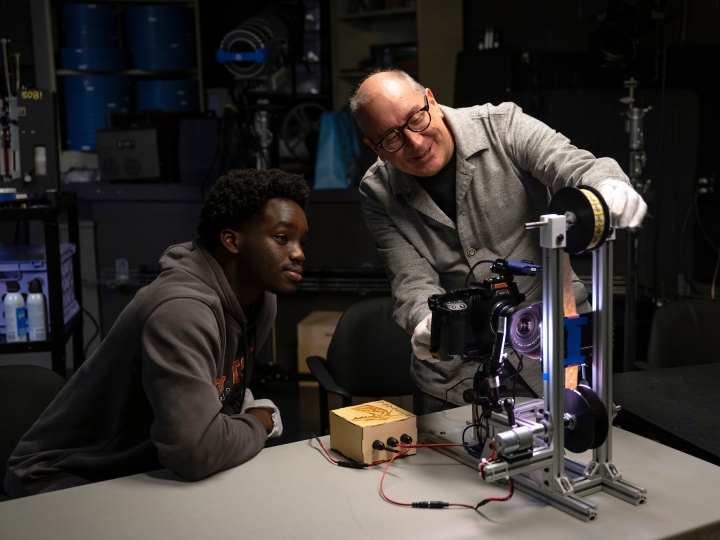
Bucknell’s Production of ‘Anthracite Fields’ Rounds Out a Year of Coal Region-related Programming
July 12, 2017
Photo by Emily Paine, Communications
If there's a perfect musical composition to close Bucknell's yearlong coal series, it's Anthracite Fields. Julia Wolfe's Pulitzer-winning, 60-minute oratorio wowed an April 1 audience at the Weis Center for the Performing Arts and seemed custom-tailored for Coal Collections: Local, National and International Stories. Spotlighting Bucknell's geographic proximity to coal country, the University's production also celebrated the collaborative spirit in a single life-changing performance.
Learn more about applying to Bucknell
"No matter how stressful rehearsing was, that hour of the performance was unlike anything we've ever done before," says Justina Bernard '19, a music education major who sings alto 1 in the Bucknell Camerata. "Experiencing that collaborative process, having the composer right there to tell you why she did certain things, and seeing so many moving parts come together was incredible."
Weis Center Executive Director Kathryn Maguet loved Anthracite Fields when she first heard it in 2014, so she coordinated a Bucknell production and brainstorming sessions with colleagues in the Center for Sustainability & the Environment's Place Studies Program to develop coal-related programs. So many ideas emerged, the yearlong Coal Collections was born and Anthracite Fields took the lineup’s finale position.
"It was a technically challenging piece for us, but I thought we nailed it," Maguet says. "It's like the stars lined up on this one."
Music Professor Beth Willer, director of choral activities, saw the ambitious undertaking as an opportunity for Bucknell Camerata to experience multipronged collaboration with professional musicians.
"I was broadly aware of Anthracite Fields when it received the Pulitzer in 2015," Willer says. "The opportunity to work with Bang on a Can All-Stars [the professional ensemble accompanying the performance] was once in a lifetime, and the piece is so relevant to this place, which gives it exceptional meaning. Julia is brilliant, and to have her here and have her feedback — that doesn't happen often for undergraduate students."
Rehearsals began in January. Even for seasoned music students, the minimalist piece was tough.
"Rehearsing was very intense, and it was hard to get a whole picture of the piece with just the singers and a rehearsal pianist," says Timothy Lambert '17, a music education major who sings tenor 1. "But it was an incredibly profound experience for me and others as well."
The performance, under Willer's direction, featured 53 singers, including the Lycoming Chamber Choir. In rehearsals, Willer emphasized the end product.
"It's rhythmically challenging," Bernard says. "There are a lot of repeated notes and patterns. Just the amount of music — we got this enormous book to learn. It's easy to make mistakes, so rehearsing was definitely a process, but we were excited and kept the bigger picture in mind."
The week of the show, the All-Stars rehearsed with students, and Wolfe infused nuance that refined their performance.
"Julia would offer insights about the piece," says Karah Barrist '18, a music education major who sings soprano 1. "I was grateful she was there to explain little things we may have missed. I didn't expect to have the emotional connection to it that I felt when we actually performed it."
Meanwhile, English Professor G.C. Waldrep's students were experiencing Anthracite Fields from another angle. Waldrep used it to demonstrate how Wolfe produced lyrics by recycling existing texts, including children's rhymes, speeches and even a list of miners' names.
"Students were very intrigued by the idea of creating artwork out of pre-existing material that's found," Waldrep says. "We talked about the creative process and how for most artists, writers and musicians, there's this terrible moment of facing the blank page and having to make something out of nothing. What if there are other ways to create so you don't have to face that blank page?"
Pre- and postconcert discussions with Waldrep and Wolfe were captured by a New York Times reporter who featured Bucknell's performance as an entrée into an article about coal's unlikely propulsion into the national election and its future. Wolfe says, for students the composition's novelty (and that publicity) created an excitement in their performance.
"The sound was very strong and unified — I was happily surprised," Wolfe says. "There's an energy that comes with a new experience. And then suddenly there's a major publication interested in it too — that's exciting and adds to the support for trying new things."
Wolfe appreciated that Bucknell told coal's bigger story with related programming, including a photo exhibit and free transportation from the coal region so community members could enjoy Anthracite Fields.
"All the attention Bucknell paid to making it a deeper experience adds a dimension that doesn't necessarily happen out in the world," she says. "It's an important and beautiful thing when a university reaches out to connect with its region."

